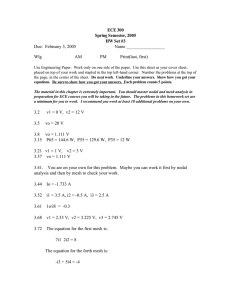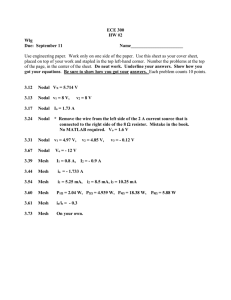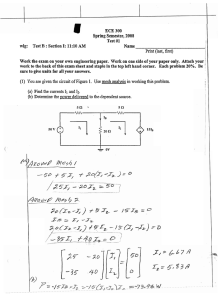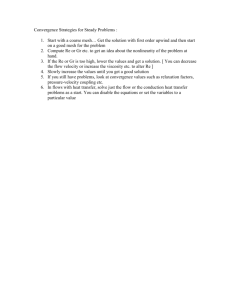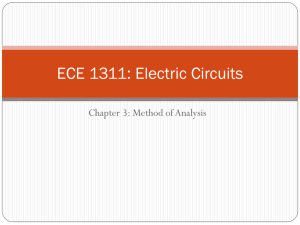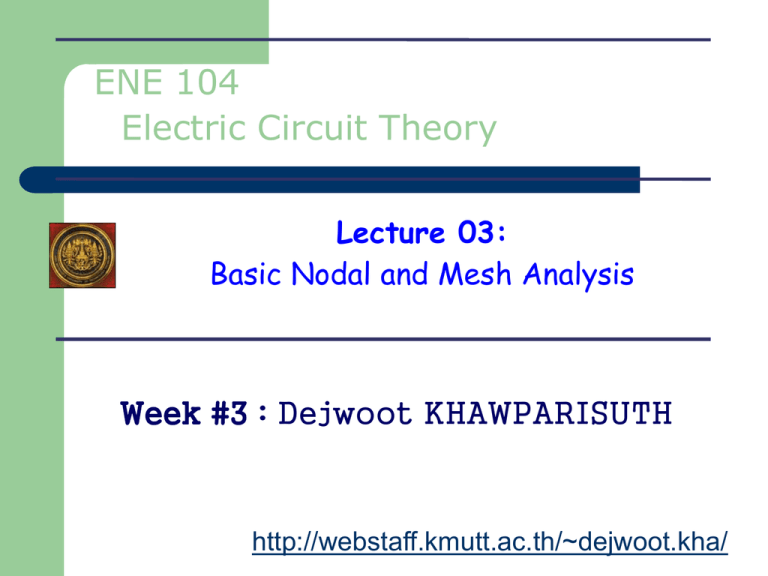
ENE 104
Electric Circuit Theory
Lecture 03:
Basic Nodal and Mesh Analysis
Week #3 : Dejwoot KHAWPARISUTH
http://webstaff.kmutt.ac.th/~dejwoot.kha/
Objectives :
Page 2
• Implementation of the nodal analysis
• Implementation of the mesh analysis
• Supernodes and Supermeshes
• Basic computer-aided circuit analysis
ENE 104
Basic Nodal and Mesh Analysis
Week #3
Example: 4.2
Page 3
find the nodes voltages:
ENE 104
Basic Nodal and Mesh Analysis
Week #3
Practice: 4.2
ENE 104
Basic Nodal and Mesh Analysis
Page 4
Week #3
Practice: 4.2
Page 5
v1
Node 1:
Node 2:
Node 3:
ENE 104
v2
v3
v1 v3 v1 v2
3
0
2
1
v2 v1 v2 v2 v3
0
1
3
4
v3 v1 v3 v2 v3
7
0
2
4
5
Basic Nodal and Mesh Analysis
Week #3
The Supernode:
Page 6
find the nodes voltages:
ENE 104
Basic Nodal and Mesh Analysis
Week #3
The Supernode:
Page 7
find the nodes voltages:
i
ENE 104
Basic Nodal and Mesh Analysis
Week #3
The Supernode:
Page 8
find the nodes voltages:
i
ENE 104
Basic Nodal and Mesh Analysis
Week #3
Practice: 4.3
Page 9
Compute the voltage across each current source
ENE 104
Basic Nodal and Mesh Analysis
Week #3
Practice: 4.3
Page 10
v1
v2
Node 1:
v1 v2
v1
4
i
0
1
1
3
2
Node 2:
v2 v1
v2
i
9 0
1
1
3
6
Supernode 1-2: 4
ENE 104
v1 v2
v1
v2 v1 v2
9 0
1
1
1
1
3
2
3
6
Basic Nodal and Mesh Analysis
Week #3
Example: 4.4
Page 11
Determine the node-to-reference voltages in the circuit below.
ENE 104
Basic Nodal and Mesh Analysis
Week #3
Example:
Page 12
Determine the node-to-reference voltages in the circuit below.
ENE 104
Basic Nodal and Mesh Analysis
Week #3
Practice: 4.4
Page 13
Use nodal analysis to find vx, if element A is (a)
a 25 Ω; (b) a 5-A current source, arrow pointing
right; (c) a 10-V voltage source, positive
terminal on the right; (d) a short circuit
ENE 104
Basic Nodal and Mesh Analysis
Week #3
Practice:
Page 14
Use nodal analysis to determine the nodal
voltage in the circuit.
ENE 104
Basic Nodal and Mesh Analysis
Week #3
Mesh Analysis:
Page 15
Mesh analysis is applicable only to those
networks which are planar.
Examples of planar and nonplanar networks
Mesh is a loop that doesn’t contain any other loops.
ENE 104
Basic Nodal and Mesh Analysis
Week #3
Path, Closed path, and Loop:
Page 16
(a) The set of branches identified by the heavy lines is neither a path nor a
loop. (b) The set of branches here is not a path, since it can be traversed
only by passing through the central node twice. (c) This path is a loop but
not a mesh, since it encloses other loops. (d) This path is also a loop but
not a mesh. (e, f) Each of these paths is both a loop and a mesh.
Basic Nodal and Mesh Analysis
Week #3
ENE 104
Example: 4.6
Page 17
Determine the two mesh currents, i1 and i2, in the circuit below.
For the left-hand mesh,
-42 + 6 i1 + 3 ( i1 - i2 ) = 0
For the right-hand mesh,
3 ( i2 - i1 ) + 4 i2 - 10 = 0
Solving, we find that i1 = 6 A and i2 = 4 A.
(The current flowing downward through
the 3- resistor is therefore i1 - i2 = 2 A. )
ENE 104
Basic Nodal and Mesh Analysis
Week #3
Practice: 4.5
Page 18
Determine i1 and i2
ENE 104
Basic Nodal and Mesh Analysis
Week #3
Practice: 4.5
ENE 104
Page 19
Mesh 1:
6 14i1 10i1 i2 0
Mesh 2:
10i2 i1 10i2 5 0
Basic Nodal and Mesh Analysis
Week #3
Example: 4.7
Page 20
determine the three mesh currents
ENE 104
Basic Nodal and Mesh Analysis
Week #3
Example:
Page 21
determine the three mesh currents
ENE 104
Basic Nodal and Mesh Analysis
Week #3
Practice: 4.6
Page 22
Determine i1 and i2
ENE 104
Basic Nodal and Mesh Analysis
Week #3
Practice: 4.6
Mesh 1:
10 4i1 i2 3 0
Mesh 2:
4i2 i1 5i2 9i2 10i2 i3 0
Mesh 3:
ENE 104
Page 23
3 10i3 i2 8i3 0
Basic Nodal and Mesh Analysis
Week #3
The Supermesh:
Page 24
Find the three mesh currents in the circuit below.
ENE 104
Basic Nodal and Mesh Analysis
Week #3
The Supermesh:
Page 25
Find the three mesh currents in the circuit below.
ENE 104
Basic Nodal and Mesh Analysis
Week #3
The Supermesh:
ENE 104
Basic Nodal and Mesh Analysis
Page 26
Week #3
The Supermesh:
Page 27
Find the three mesh currents in the circuit below.
Creating a “supermesh” from meshes 1 and 3:
-7 + 1 ( i1 - i2 ) + 3 ( i3 - i2 ) + 1 i3 = 0
[1]
Around mesh 2:
1 ( i2 - i1 ) + 2 i2 + 3 ( i2 - i3 ) = 0
[2]
Finally, we relate the currents in meshes 1 and 3:
i1 - i3 = 7
[3]
Rearranging,
i1 - 4 i 2 + 4 i3 = 7
[1]
-i1 + 6 i2 - 3 i3 = 0
[2]
i1
[3]
- i3 = 7
Solving,
i1 = 9 A, i2 = 2.5 A, and i3 = 2 A.
ENE 104
Basic Nodal and Mesh Analysis
Week #3
Practice: 4.8
Page 28
Find the voltage v3 in the circuit below.
ENE 104
Basic Nodal and Mesh Analysis
Week #3
Practice: 4.8
Page 29
Find the voltage v3 in the circuit below.
iB
iA
ENE 104
Basic Nodal and Mesh Analysis
Week #3
Practice: 4.8
Page 30
Find the voltage v3 in the circuit below.
iB
iA
ENE 104
Basic Nodal and Mesh Analysis
Week #3
A comparison:
ENE 104
Basic Nodal and Mesh Analysis
Page 31
Week #3
A comparison:
ENE 104
Basic Nodal and Mesh Analysis
Page 32
Week #3
A comparison:
ENE 104
Basic Nodal and Mesh Analysis
Page 33
Week #3
A comparison:
ENE 104
Basic Nodal and Mesh Analysis
Page 34
Week #3
Ex:
Page 35
Ch4-26 p.94 Determine each mesh current in the circuit
ENE 104
Basic Nodal and Mesh Analysis
Week #3
Computer-Aided:
ENE 104
Basic Nodal and Mesh Analysis
Page 36
Week #3
Computer-Aided:
ENE 104
Basic Nodal and Mesh Analysis
Page 37
Week #3
Example:
Page 38
Ch4.58 p.100 Write an appropriate input deck
for SPICE to find v5 in the circuit. Submit a
printout of the output file, with the solution
highlight
ENE 104
Basic Nodal and Mesh Analysis
Week #3
Homework:
ENE 104
Circuit Analysis and Electrical Engineering
Page 39
Week #3
Reference:
Page 40
W.H. Hayt, Jr., J.E. Kemmerly, S.M. Durbin, Engineering Circuit Analysis, Sixth Edition.
Copyright ©2002 McGraw-Hill. All rights reserved.
ENE 104
Basic Nodal and Mesh Analysis
Week #3

